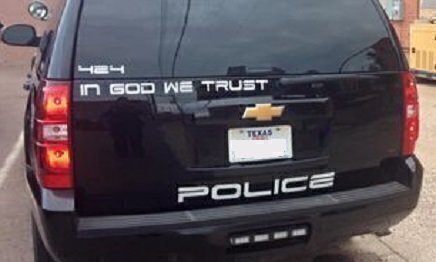The state of Texas and a group promoting the separation of church and state don’t see eye-to-eye over a growing practice of police cars displaying the motto “In God We Trust.”
 Last week, Texas Attorney General Ken Paxton issued a legal opinion that police cars showing the motto in his state aren’t violating the First Amendment’s Establishment clause.
Last week, Texas Attorney General Ken Paxton issued a legal opinion that police cars showing the motto in his state aren’t violating the First Amendment’s Establishment clause.
“A court is likely to conclude that a law enforcement department's display of the national motto, ‘In God We Trust,’ on its patrol vehicles is permissible under the Establishment Clause of the United States Constitution,” Paxton said, citing a long list of court decisions.
The Freedom From Religion Foundation has been fighting the displays in Texas and other states, and it wasn’t impressed with Paxton’s reasoning. The foundation has sent letters to more than 60 police departments around the country asking them to stop the practice.
Before Paxton issued his opinion, the foundation called the process “phony pandering” in a statement.
“The attorney general's opinion is a fait accompli. We all know what the attorney general will rule: Congress adopted "In God We Trust" as a motto, therefore it's not only fine, it's patriotic for the Childress Police department to place it on its vehicles,” the group said in a October 6 statement. “Piety or faith are not and should not be synonymous with patriotism. But godliness has been equated with good citizenship since this unconstitutional and misguided law passed in 1956.”
In 1956, President Dwight Eisenhower signed Public Law 84-140, which was passed by the 84th Congress, directed the Treasury to use “In God We Trust” on money. Congress also said in a joint resolution, Public Law 84-851, that “the national motto of the United States is hereby declared to be 'In God we trust.’”
In recent years, the Freedom From Religion Foundation and others have challenged to motto’s use on various First Amendment grounds.
For example, in 2014, the U.S. Court of Appeals for the Second Circuit, based in New York City, said that the use of the phrase “In God We Trust” on American currency was constitutionally permissible in the case of Newdow v. United States.
The suit was brought by the attorney Michael Newdow on behalf of 11 atheists and humanists, and two organizations. Newdow famously won a ruling in 2002 from the United States Court of Appeals for the Ninth Circuit that struck the words “Under God” from the Pledge of Allegiance. (That ruling was later overturned by the Supreme Court.)
The Second Circuit didn’t agree with the argument that the words violated the First Amendment’s Establishment and the Free Exercise clauses, as well as the Religious Freedom Restoration Act of 1993.
“We have never addressed the question of whether the inclusion of the words ‘In God We Trust’ on United States currency violates the Constitution or [Religious Freedom Restoration Act] and write today to clarify the law on this issue,” the opinion states. “Four other circuit courts have ruled on this question, however, and have found that the statutes at issue do not contravene the Constitution.”
Since then, the Supreme Court ruled in a case called Walker v. Texas Division, Sons of Confederate Liberty that dealt questions about messages on license plates as government speech. A divided Court said the state of Texas could refuse a request to put a Confederate flag of a state-issued vanity plate.
In a George Washington University law review article, Professors Peter J. Smith and Robert W. Tuttle looked at how that decision could impact the display of messages on government property that conflicted with the Establishment clause.
“In a prior decision, for example, the [Texas] Board approved a specialty license plate design that depicts three Christian crosses on a hill and the motto ‘One State Under God.’ If indeed the messages conveyed by specialty license plate designs in Texas constitute government speech, as the Court held in Walker, then this design and message give rise to a colorable claim under the Establishment Clause. Under current doctrine, an official embrace of a particular faith group’s religious message violates the Clause,” the professors said.
But they also argued this reasoning may not apply to the use of “In God We Trust.”
“For example, Kentucky (among a significant number of states) has adopted a plate with the message 'In God We Trust.' Few would believe that this message—which appears on United States currency—offends the Establishment Clause,” they said.







